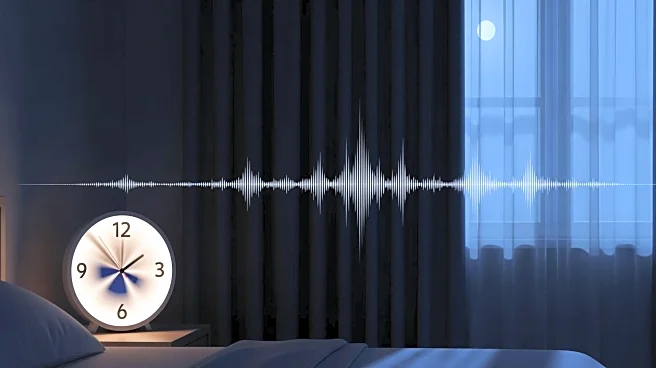What's Happening?
Recent research from the University of Oxford has identified a connection between tinnitus and sleep patterns, suggesting that deep sleep may suppress tinnitus-related brain signals. Tinnitus, a condition
affecting over 250 million people globally, is characterized by persistent phantom sounds such as hums, hisses, or rings. Traditionally viewed as a static ear condition, the new study reframes tinnitus as a dynamic brain state influenced by the body's internal rhythms. The research, published in Brain Communications, highlights the role of non-REM sleep in counteracting hyperactive neuronal firing linked to tinnitus. Studies involving ferrets exposed to loud noise showed disrupted sleep patterns and overactive brain responses, indicating a link between tinnitus and sleep disturbances. The findings suggest that enhancing deep sleep could interrupt the pathological loop causing tinnitus, offering a potential therapeutic pathway.
Why It's Important?
The implications of this research are significant for the millions affected by tinnitus, as it offers a new perspective on treatment options. By focusing on the brain's natural dynamics rather than external interventions, this approach could lead to therapies that enhance deep sleep to mitigate tinnitus symptoms. The study also highlights the co-occurrence of tinnitus and sleep disorders, suggesting a vicious cycle where poor sleep exacerbates tinnitus and vice versa. Understanding this relationship could lead to early interventions that prevent chronic tinnitus, particularly if sleep is supported during the onset of symptoms. This research could shift the focus of tinnitus treatment from peripheral ear damage to central brain activity, potentially improving quality of life for sufferers.
What's Next?
Future research will aim to identify neurophysiological markers of tinnitus during sleep and test methods to reinforce deep-sleep brain activity. The goal is to develop therapies that not only mask tinnitus but interrupt the brain's faulty feedback loop at its source. Large-scale studies are needed to confirm these findings and explore the potential of non-invasive neurostimulation to enhance slow-wave activity. Researchers believe that early intervention, particularly in the hours or days after tinnitus onset, could prevent it from becoming chronic. This approach could lead to more targeted public health strategies and resource allocation for tinnitus treatment.
Beyond the Headlines
The research reframes tinnitus as a brain rhythm disorder rather than a peripheral ear issue, aligning with broader theories in neuroscience about phantom percepts stemming from dysregulated spontaneous brain activity. This perspective suggests that tinnitus is a maladaptive brain prediction, generating sound in the absence of real stimuli. By amplifying or supporting deep sleep, it may be possible to rebalance the brain's auditory pathways and interrupt the pathological loop causing tinnitus. This approach could lead to a new class of therapies rooted in the body's own architecture, offering hope for those affected by this challenging condition.









